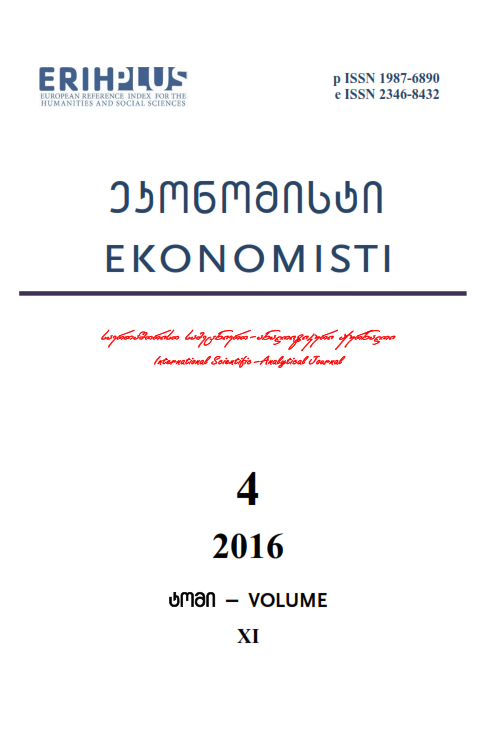
The international scientific and analytical, reviewed, printing and electronic journal of Paata Gugushvili Institute of Economics of Ivane Javakhishvili Tbilisi State University

Opportunities for the implementation of Economic Policy of Environmental Protection in Urban Space
Exspanded summary
Modern world has been facing the problem of environmental pollution and misusage of natural resources already for decades, sadly as a main reason of it is considered growth of the emerging economies and industrial development. It is impossible to discuss Environmental protection from the point of view of only one discipline. For economics it is particularly important to study the economic effect caused by environmental pollution. Various countries of the world have been attempting to promote the means of environmental protection from the 90s. The purpose of the thesis is to study environmentally efficient measures that can be implemented in densely populated urban environments. In 1992, at the Earth Summit in Rio de Janeiro, Brazil, where 172 countries participated, they adopted specific provisions to ensure the economic policy of states to promote environmental protection and rational usage of natural resources.
From the Rio Conventions, I think the following issues are important while implementing environmental policies in Georgia:
- Climate change;
- Desertification;
- Maintaining biodiversity.
Regarding climate change, according to the Convention, it is essential that the member states reduce the 90s volume of greenhouse gas emissions. Since Georgia's manufacturing systems have been stagnated over the years, our country has not had this problem yet and Georgia's greenhouse gases are normally present. It is noteworthy that the reduction of greenhouse gas emissions in the atmosphere is virtually impossible, which is why the global warming will be accompanied by the years.
The desertification is a problem that is one of the most important issues in the city. Implementation of infrastructural projects and accomplishment activities often leads to the complete destruction of the soil fertile layer, which is particularly negatively impacted in urban environments.
The next issue is the maintenance of biodiversity. Maintaining urban flora is a necessary precondition for biodiversity conservation.
For example, one of the most important problems for The flora of Tbilisi is the Georgian mulberry tree, which causes the pollution of the streets, and the strong root system is damaging the walls of the private houses and the walls of the yard, because of these the population is systematically fighting against it, which can cause the disappearance of this kind of species. There are also some of the trees that are quite widespread in the city, most of them are between 20 and 50 years of age, which can cause a variety of problems as well as damaging the local inhabitant’s properties, and sometimes even people. The replacement of the above-mentioned trees is difficult and in short-term conditions is impossible, therefore, urban flora is facing danger. According to the resolution of Tbilisi Municipality City Council, the protection of trees is possible for only one way which implies the formation of trees in the special cases.
Besides Rio Convention, Georgia is obliged to pursue environmental protection policies in accordance with Association Agreement with the EU.
Introduction of Urban Gardening Development and Promotion Program is very important in densely populated areas. In Germany, some part of the local population refuses to consume products offered by large companies and prefers consumption and production of local products.
In studying the issue, it became clear that urban gardening has proved to be one of the most efficient and interesting measures for the Germans and other European countries to support environmental protection in urban areas. One of the main problems in the urban environment is desertification and the reduction of biodiversity that can be caused for instance by the implementation of infrastructural projects, that in many cases, completely destroys soil fertile layer. In addition to the production process urban gardening allows the renewal of soil fertility layer. Moreover, it helps to improve dendrology and green areas. As regards climate change, the growth of green plants and trees in the city directly affects the reduction of greenhouse gas emissions.
Stemming from the above, we can discuss urban gardening opportunities and development prospects. Thus, the positive aspects of urban gardening are:
- Local production will be stimulated;
- The population will be able to purchase ecologically clean and natural products at a market price;
- The economic condition of the inhabitants of the precinct where urban gardening is launched will be improved;
- Urban gardening will be attractive for tourists (they will be very interested to see the production of rural products in the city center);
- Importer firms will be more willing to work in the direction of ecologically pure products, as local production will be more competitive;
- Penvironment protection issues will be promoted and advocated;
- The risks of desertification and biodiversity degradation will be reduced.
Of course, unlike Germany, urban gardening in Georgian space can face to certain difficulties. However, this system is possible to implement. At the same time, if prices are reasonable, the population will be more interested and we will have another opportunity to get closer to european reality. For the Government, we have the following recommendations to encourage the population:
- Identify the land areas on the balance of the Ministry of Economy or Self-Government Unit which are not used by the State at this time;
- Provide certain benefits to urban gardeners;
- In the framework of the possibilities to set the necessary infrastructure for the gardens;
- Take the necessary measures to increase the promotion of urban gardening;
- Improve awareness of the population to improve environmental policy.
Obviously, in the nearest future the world will face the need of urban gardening to play a major role in the development of cities and I think that Georgia has the potential to become one of the first countries in the region to implement this project successfully and to give specific recommendations to neighbor countries.
